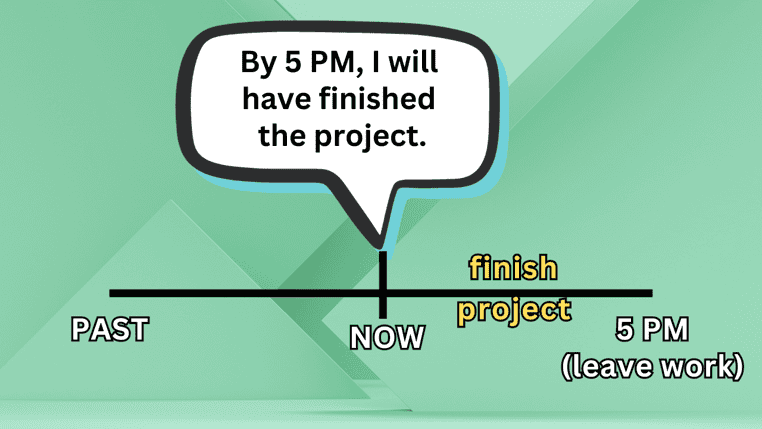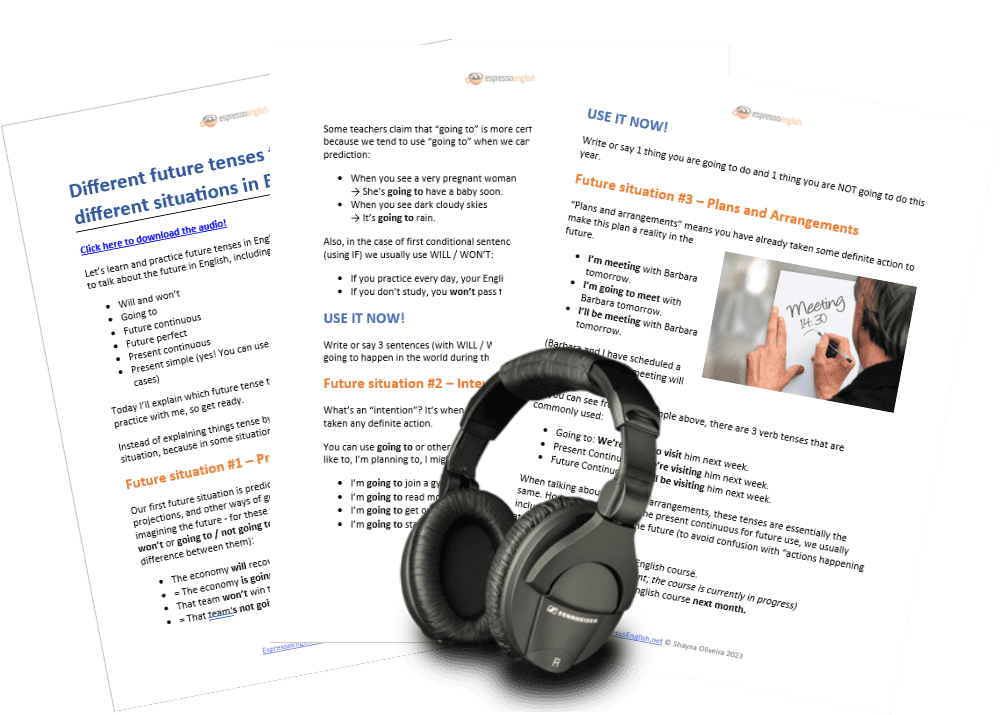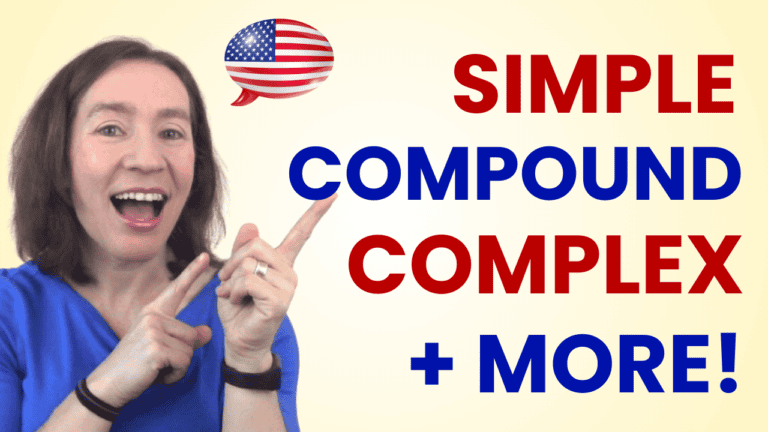Let’s learn and practice future tenses in English!
Many English learners say WILL all the time… but native English speakers have a whole bunch of ways to talk about the future in English, including:
- Will and won’t
- Going to
- Future continuous
- Future perfect
- Present continuous
- Present simple (yes! You can use those to talk about the future in specific cases)
Today I’ll explain which future tense to use in which situation – and I’ll ask you to practice with me, so get ready. You’ll definitely want to download the free lesson guide so that you can review everything.
Instead of explaining things tense by tense, I’m going to do it situation by situation, because in some situations we can use multiple tenses!
#1 – For Predictions: Use WILL / WON’T or GOING TO
Predictions, projections, and other ways of guessing or imagining the future can all use WILL/WON’T or GOING TO (with no difference):
- The economy will recover quickly.
= The economy is going to recover quickly. - That team won’t win the game.
= That team‘s not going to win the game.
Some teachers claim that “going to” is more certain than “will,” and I think it’s because we tend to use “going to” when we can easily see the evidence for our prediction:
- When you see a very pregnant woman → She’s going to have a baby soon.
- When you see dark cloudy skies → It’s going to rain.

In the case of first conditional sentences (using IF) we usually use WILL / WON’T:
- If you practice every day, your English will improve fast.
- If you don’t study, you won’t pass the test.
Use it now!
Write or say 3 sentences (with WILL / WON’T or GOING TO) predicting what is going to happen in the world during the next 10 years.

#2 – For Intentions: Use GOING TO
What’s an “intention”? It’s when you want to do something, but you have not yet taken any definite action.
You can use going to or other phrases for New Year’s resolutions (I hope to, I’d like to, I’m planning to, I might, I’m thinking of):
I’m going to join a gym.
I’m going to read more books.
I’m going to get out of debt this year.
I’m going to start doing some volunteer work.
Use it now!
Write or say 1 thing you are going to do and 1 things you are NOT going to do this year.
#3 – For Plans and Arrangements, you can use 3 verb tenses:
“Plans and arrangements” means you have already taken some definite action to make this plan a reality in the future.
- I’m meeting with Barbara tomorrow.
- I’m going to meet with Barbara tomorrow.
- I’ll be meeting with Barbara tomorrow.
(Barbara and I have scheduled a time to meet, so the meeting will definitely happen)

As you can see from the example above, there are 3 verb tenses that are commonly used:
- Going to: We’re going to visit him next week.
- Present Continuous: We’re visiting him next week.
- Future Continuous: We’ll be visiting him next week.
When talking about plans and arrangements, these tenses are essentially the same. However, when using the present continuous for future use, we usually include the specific time in the future (to avoid confusion with “actions happening at the moment”):
I’m taking an intensive English course.
(right now, at this moment; the course is currently in progress)I’m taking an intensive English course next month.
(in the future)
Use it now!
Write or say 3 sentences about plans or arrangements you have for the upcoming months.
#4 – For Decisions in the Moment, Promises, and Offers, use WILL:
One of the most common decisions made in the moment is when ordering at a restaurant:
Ordering at a restaurant:
I’ll have the salmon with a side order of vegetables.
I’ll have the chicken salad.
I’ll have a slice of apple pie with ice cream.

Also use WILL when you are offering to help someone, or making a promise:
- I’ll help you with your homework.
= I am offering to help you with your homework. - We’ll give you a ride to the train station.
= We are offering to take you to the train station. - I’ll call you at 5:00.
= I promise to call you at 5:00. - I’ll always love you.
= I promise to love you forever.
Use it now!
Imagine that your best friend is very sick and can’t leave the house. Write or say one thing that you can do to help her. (“I’ll cook you dinner…” “I’ll pick up your kids from school…” etc.)
#5 – For Scheduled Events, use the PRESENT SIMPLE:
“Scheduled events” are things like:
Transportation schedules (flights, trains, etc.)
Our flight leaves at 8:00.
Conferences and events (meetings, lectures, classes)
The conference starts next Thursday.
Things that operate on a regular schedule (bank or store opening / closing)
The supermarket closes in 15 minutes.
These are different from “plans and arrangements” because in general, they are things we have no control over.

#6 – For actions that will be completed before a specific time in the future, use the FUTURE PERFECT:
Here’s an example:
- Imagine that right now it is 12:00 PM.
- I will leave work at 5:00 PM.
- Before I leave work, I am definitely going finish a project.
So I can say: “By 5:00 PM, I will have finished the project.”
Or: “By the time I leave work, I will have finished the project.”

The future perfect is typically used with by and by the time.
Some people call the future perfect tense “the future in the past” because I am imagining being at a future point (5:00 PM) looking back on an action that was completed in the past.
Use it now!
What’s one thing you will have done by this date next year?
“By this time next year, I will have written a book,” for example.
Review: Future Tenses in English
- Predictions: will/won’t or going to
- Intentions: going to
- Plans/arrangements: going to, future continuous, present continuous
- Decisions in the moment, promises, offers: will
- Scheduled events: present simple
- Things that will be completed before a future time: future perfect
Let me know if you have any questions about future tenses in English, and make sure to download the free PDF guide to this lesson.
I’d also love to help you even more inside my Advanced English Grammar Course, where we go in detail into lots of important grammar topics. And there are lots of opportunities to put it into practice, like we did today – so that you can speak and write with good grammar.











